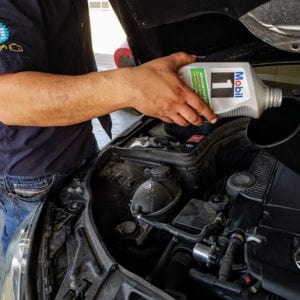We spend a great deal of money on our cars, so it is very important — and more economical in the long run — to take good care of your car. In addition to routine servicing, choosing the right motor oil during an oil change is the most important thing you can do to prolong your car’s life and make your driving more enjoyable and safe.
Motor oil is, effectively, the heart and soul of your car engine… it is what keeps your car functioning smoothly. How motor oil works is pretty simple: it protects your car’s engine by preventing or reducing heat and friction by acting as a lubricant.
Considering the importance of motor oil, it is pretty obvious that you should use the car manufacturer’s recommended oil type when it is time for an oil change. But what happens if you put the wrong motor oil in your engine? In today’s blog, we are going to take a look at the potential damage you can do to your car by using the wrong engine oil.
The Car Won’t Start In The Cold.
Engine oil “viscosity” (denoted by a number followed by the letter “W”) refers to how easily oil flows at a specified temperature. The lower the number, the thinner the oil.
Since motor oil with a lower viscosity (e.g., 5W-20) is thinner, it flows better than motor oil with a higher viscosity (e.g., 20W-50) that is much thicker. What this means is that if the motor oil in your car’s engine is too thick, it will not be able to properly lubricate the components of the engine properly, causing excess resistance when you start the car.
In other words, your car will probably take a long time to start (if it even starts) at freezing temperatures, if you use the motor oil with the wrong viscosity. This is, of course, incredibly inconvenient and may even put your life at risk in an emergency.

Burning smell.
Just as higher-viscosity motor oil does not do well in colder climates, lower-viscosity motor oil starts to break down under extremely hot conditions. As a result, it ends up losing its cohesive strength and is unable to lubricate all moving parts properly.
The excess friction between metal components results in the motor oil “burning” (which explains the smell). The burning oil also has the potential to cause long-term damage to your car’s engine — and that is a very expensive problem to fix!
Oil Leaks.
If you use synthetic oil on an older or higher mileage car instead of conventional motor oil — even if they have the same viscosity ratios — you may start having oil leaks. This is due to the fact that synthetic oils have different flow characteristics than regular motor oil and can “squeeze” through tight spaces than regular oil. While such oil leaks are certainly not damaging, this can increase your visits to the gas station.
Engine Noises.
Using synthetic oil on an older or high mileage car instead of conventional motor oil has another major problem. It can make your car noisier, which will usually be the loudest right after firing up. This is because synthetic oil, as we mentioned above, slips more quickly into engine clearance when compared to conventional motor oil.
Low efficiency
Using motor oil with higher viscosity (oil that is too thick) also reduces your car’s overall fuel efficiency. This is because the thicker the motor oil, the higher its resistance on vital metal components, such as pistons.
What happens when you add synthetic oil to conventional engine oil (or vice versa)?
If you accidentally mix conventional motor oil with synthetic motor oil, there is really nothing you need to worry about. The only reason why you would probably want to avoid doing this is that synthetic motor oil is expensive, and by mixing the two types, you are simply not getting the benefits of the refined, distilled and purified synthetic oil since the conventional oil is compromising those benefits.
What happens when you add a thicker oil to a thinner oil (or vice versa)?
Again, if you accidentally mix thicker motor oil with thinner motor oil, it will not damage your car’s engine (not for that one time you “accidentally” do it, at least). However, it will surely take you a little further away from the oil viscosity (or thickness) recommended by the car manufacturer — and that is not good.
What happens when you mix different oil brands?
While it is not recommended to mix various brands of motor oil (such as Valvoline, Castrol, Total or Mobil 1), it will not cause any damage to your engine. What is far more important is to stick with the same oil viscosity as recommended by the car manufacturer.
So there you go, this is what happens when you use the wrong motor oil in your engine.
If you are still uncertain about what type of motor oil you should use, consult your owner’s manual. Your car manufacturer is perhaps the best source of information to identify the best motor oil type for your car.
Aloha Auto Repair Is Your Trusted Mechanic Shop In Allen, Texas!
Regular oil changes are the single most important part of vehicle maintenance; they can save you money and add more years to the life of your car as well. Come to Aloha Auto Repair for an oil change to help protect your engine and improve the environment by reducing the carbon put into the air from worn, sludgy oil. We can help guide you through the process of picking the best oil type, so your car runs smoothly for years to come.




 ©2024 Drive Automotive Services Group
©2024 Drive Automotive Services Group